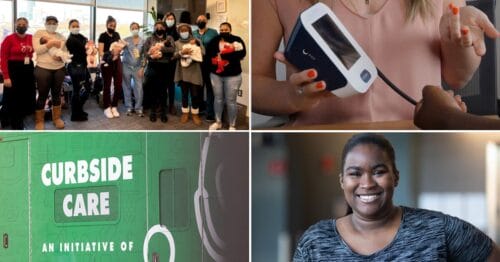Access and Timely Care Improve for Racially Diverse Children When Federally Qualified Health Centers Integrate Behavioral Health
April 21, 2022

Maskot, Getty Images
Three community-based health centers used the Transforming and Expanding Access to Mental Health Care in Urban Pediatrics (TEAM UP) model, leading to more behavioral health screenings than the statewide average.
The Bottom Line
Integrating behavioral health care into pediatric primary care at federally qualified health centers (FQHCs) resulted in greater access more accessibility, more timely care, and higher diagnostic rates of attention deficit hyperactivity disorder (ADHD) for children.
Context
Behavioral health conditions are a common issue in children: more than 15% of children in the United States have a behavioral health condition — and yet, only about 20% of those children receive needed treatment. Barriers to treatment include a shortage of mental health providers, long wait times, cost, and social determinants of health (SDoH) that can make it difficult to access health care in general, especially for children who are racially and ethnically diverse.
Previous research has shown that integrating behavioral health into pediatric primary care can be an effective way to improve access to behavioral health care. However, evidence gaps still exist regarding the wide range of inequities and challenges that racially and ethnically diverse children may experience in accessing quality healthcare. Specifically, many of the integrated care models have not been studied in communities of low socio-economic status or among children of color.
FQHCs are community-based centers that provide primary care for traditionally underserved populations. They focus on delivering accessible and affordable primary health care to millions of people each year, or about one in 11 Americans, including one in three individuals living in poverty and one in five who are uninsured. TheTransforming and Expanding Access to Mental Health Care in Urban Pediatrics (TEAM UP) is a model developed by Boston Medical Center and three FQHCs in the greater Boston area. TEAM UP was designed to increase access to comprehensive, high-quality behavioral health care to populations who are traditionally underserved.
Study Objective
Support the effectiveness of integrating pediatric behavioral health to FQHCs, which serve populations of patients who are diverse in terms of race/ethnicity, language, culture, and service needs.
The Details
Data for this study was collected from three FQHCs between June 2017 and November 2019 and included 47,437 unique well-child visits for children ages 30 days to 18 years. Almost half of these patients were living below the federal poverty level, and more than 80 percent identified as non-White or Hispanic. The FQHCs reported monthly standardized electronic medical record data, which was analyzed by the researchers to assess diagnosis of behavioral health issues, receipt of services for behavioral health care, prescriptions for psychotropic medication, and ADHD care.
Findings
Using the TEAM UP model, behavioral health screenings were completed at more than 81% of well-child visits at the three FQHCs, compared to a statewide average of 74%. The number of children who followed up with a behavioral health provider within 30 days of an ADHD diagnosis increased from 62.9% to 78.3%. And children who received a warm hand-off from their primary care provider to a behavioral health provider were more likely to complete an additional visit than those who did not.
Additionally, although the number of children who received a prescription for psychotropic medications did not change, the number of children prescribed multiple psychotropic medications (polypharmacy) fell.
Pull Quote
“By engaging children in their medical homes, we are addressing barriers to care and ensuring that all children, of all ages and ethnic and racial backgrounds, can receive high-quality behavioral health support.”
Sheldrick CR, Bair-Merritt MH, Durham MP, Rosenberg J, Tamene M, Bonacci C, Daftary G, Tang MH, Sengupta N, Morris A, Feinberg E (2022): Integrating Pediatric Universal Behavioral Health Care at Federally Qualified Health Centers. Pediatrics.
Share on Social
Subscribe to HealthCity’s Newsletter
HealthCity elevates the conversation around issues of equity in healthcare. | Sent biweekly.
© 2026 HealthCity. All rights reserved.


